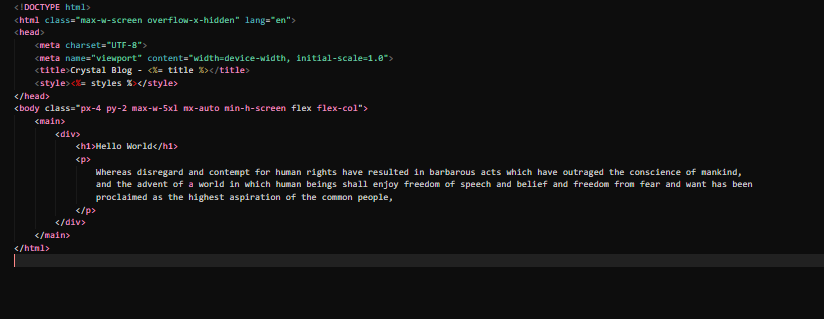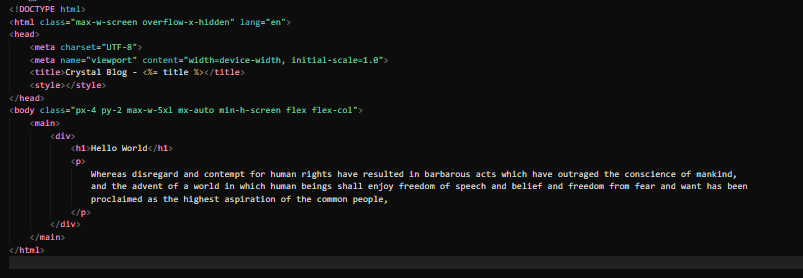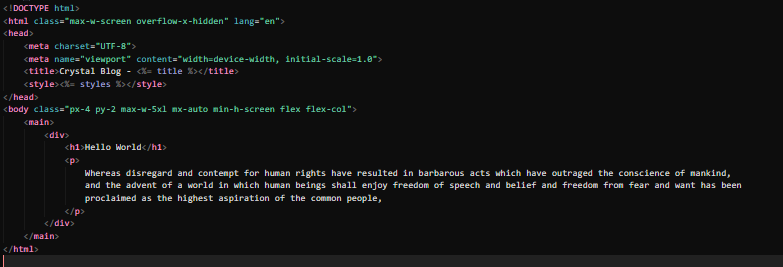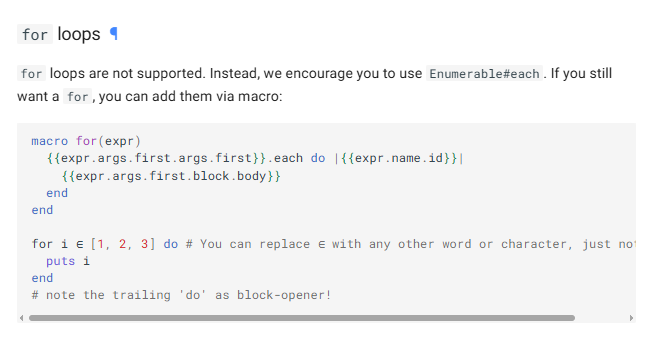I really wanted to like Crystal; the idea is amazing. “Imagine Ruby’s syntax with a static type system, and a compiled executable”, that could give you an outstanding first class developer expeirence, but in reality, it's not as simple as that, and it never is.
Crystal is a language I’ve been following and interested in for quite some time now. Crystal’s core idea has always really interested me. When I first heard of Crystal, I was getting into Ruby, and I really like its philosophy of “Ruby but statically typed and compiled”, ideally providing a more comprehensive developer experience, a faster runtime, and more portability since executables can be statically linked. I really wanted to like it, I really did, but its story isn't that of an underrated language, but an underwhelming one.
The syntax of crystal is nice, it’s basically Ruby but with a static type system, and I like Ruby’s syntax, and I like static types, it typically allows for a much better developer experience and you dont end up with md5('240610708') equaling md5('QNKCDZO') due to values being cast to superfluous types for no good reason. You can also get better IntelliSense, usually, and often type errors and other things before runtime. Despite the promising features, playing around with Crystal quickly revealed a different story.
Why Crystal failed me
Tooling Failure
Crystal’s dev experience is less peachy than you would expect, given everything I’ve told you so far. I write most of my code in VSCode, for lots of reasons, since it’s just a web app means I can literally run a web server on a container and have an instant dev environment available from anywhere as long as I have an internet connection (and preferably more than 10” of screen). However, Crystal’s tooling negates most of its usefulness.
For anything that matters, Crystal's support in VSCode is terrible, and this is with the crystal-lang-tools VSCode extension installed. Without it, there is no native support for Crystal at all, which isn’t terribly surprising if I’m being honest. The crystal tooling seems to be largely community-driven, which can be a good thing, but the vscode-crystal-lang extension on their GitHub organization has almost no activity, with the latest code change being 3 months ago and the commit before that being 9 months old at the time of writing. This lackluster tooling extends into its LSP as well.
LSP Limitations
The LSP often gives you outdated errors, and it starts to give me headaches after using it for any period of time. Its hints on hover are also not amazing, they are slow to appear, and 99% of the time, it gives you no more useful information than the type of the variable, in fact, most of the time, it gives you no hints whatsoever, and it makes you wonder if the problem is the LSP being unbelievably slow, or if the LSP just sucks.

There is no autocomplete whatsoever; you won't get recommendations for functions ever, not even built-in functions, nothing. The syntax highlighting is often lacking, and once again, it has no idea of functions that have been registered, leaving them un-highlighted. The only things that get highlighted are primitives and reserved keywords, aka basic functions, though you just have to know they exist without autocomplete. Which is definitely possible, autocomplete is not necessary, that’s the whole point of writing code on paper is to prove you can write code without your nice IDE sugar and spice, but writing code on paper is generally an exercise to prove you can do it. Imagine writing code like that forever; that’s what writing Crystal is like. In the modern development ecosystem, this is unthinkable for many devs.
Crystal has an ERB replacement that is nice to use and is nearly identical to ERB. However, while sometimes it may be nice to use, it often pains me to write. Crystal tags in ECR files are not parsed or highlighted or anything really, and they often break syntax highlighting of the entire file, with no option for recourse other than to just give up or do something completely differently.

Here, I'm putting a crystal tag in a style tag, and that just breaks everything. The reason for putting a crystal tag in a style tag is to embed the CSS for the page, so there is no FOUC. The solution would be to print the entire HTML highlight looks.

However, since ECR is nearly identical to ERB, you can rely on the mature and actually decent tooling for ECR files. For example, here’s the same example I have above, but I tell VSCode that ECR files are actually just ERB files and to highlight them like so:

Using crystal highlighting often gives you a better experience than the Crystal lang extension gives you, but unfortunately, it can't fix the terrible LSP that Crystal gives you, and highlighting Crystal code outside of ECR files as Ruby is not a great experience either.
Furthermore, Crystal’s compile times are a bit underwhelming, and if you use a watch script to increase the development speed and use of Crystal, you’ll be waiting a hot second for Crystal to recompile, even when in dev mode. This further worsens the usefulness of Crystal as a web server-focused language. I’m constantly looking for languages that would be ideal as a web server language, that provides an amazing DX, a good type system, and fast iteration. JavaScript really seems to be the best option as far as I can tell. While JavaScript has its pros, it also has plenty of cons. The attitude in the JavaScript ecosystem is to use someone else's wheel, but in JavaScript's case we have 120,000 wheels that all depend on each other. In my experience, the overreliance on JavaScript makes for a really bloated server executable and an unpleasant client-side experience.
Syntactical decisions
Crystal is meant to be a very close analogue to Ruby, but many of its syntax decisions are frustrating, to put it lightly. Crystal does not support for loops, and attempting to write one will throw confusing and unhelpful errors. What's worse is that the Crystal devs know this: In their article Crystal for Rubyists, they have this section about for loops:

This is something I absolutely despise seeing in languages, removing features for no good reason; they even know this and give you a solution to their poorly made decisions. Instead, if you want to loop 5 times, your code might look like one of these:
(0..4).each { |i| puts "Hello, world #{i}" }
(0..4).each do |i|
puts "Hello, world #{i}"
end
5.times do |i|
puts "Hello, world #{i}"
end
I don’t hate this syntax, and I even quite like the 5.times syntax, which
gives you a plain English explanation of what the code is doing from the code
itself, but why remove for loops? It just doesn’t make sense to me, especially
since Ruby already has ranges. Writing for loops would be a breeze for anyone
familiar with Ruby or Rust, or the dozens of other languages that share roughly
the same for loop syntax.
While the Crystal team encourages Enumerable#each for a more idiomatic
approach aligned with functional programming, the complete removal of for
loops feels like an unnecessary hurdle, especially when they acknowledge the
demand by providing a solution to the problem they themselves invented.
Crystal, despite being a compiled language, doesnt really have many good options for low-level things, which can be fine given it’s meant to be a replacement for ruby, but Crystal at least tries by allowing you to link to C interfaces, but severely lacks many low-level features that would be nice to use if I wanted to use Crystal as a more general purpose language rather than a compiled Ruby replacement. As I’ve been getting more into low-level stuff, I’ve liked the idea of playing around with languages in a lower-level fashion, but Crystal is a bit lacking. Despite being built on top of LLVM, it cannot compile to every target LLVM supports, not without patching the compiler.
Community
Crystal, being a smaller language, is obviously going to have less community support for things; even so, its support isn’t terrible. There are lots of “shards,” aka gems, if you’re familiar with Ruby’s terminology for these types of packages. However, it appears there's limited effort dedicated to significantly improving the developer tooling. The docs are okay, but only if you’re comfortable navigating and reading an API specification; outside of that, the docs are somewhat lacking. Shards can be helpful to give you easy solutions, but as with most languages that strongly lean on packages, like Rust or JavaScript, this ultimately leads to an over-dependence on packages and leads to an overrun in executable sizes.
What Crystal does well
Not everything Crystal has to offer is negative, however. Crystal’s type safety and performance are nice, but its benefits are far overshadowed by its poor development experience and its borderline non-existence of intellisense. Its shard system can be nice at times. Since its syntax is basically Ruby, it’s easy to pick up, and can be nice to write, when it's cooperating, so basically when the LSP isn’t working at all. Its OOP-focused design can sometimes lead to some nice paradigms, even as much as I hate OOP design sometimes. It's nice to be able to link to C libraries if I so please; it's just unfortunate that Crystal attempts to create a "safe language", but isn’t nearly as deep or as mature as Rust, Zig, or Go. The binary size is a nice break from Golang or Rust; the simple blog prototype I played around with only weighed in at 4.2MB in release mode. It's not small by any means, but it is a stark comparison to the binary sizes I have dealt with when writing dramatically simpler Rust or Go programs.
Conclusion
I really actually wanted to like Crystal, its idea is amazing, and I’ve been watching it since even before it went stable, but it really missed the mark for me, unfortunately. Its strange decisions on its syntax, and the terrible developer experience have really made the experience sub-par. It’s unfortunate that such a good idea was implemented poorly, but then again, “There are only two kinds of languages: the ones people complain about and the ones nobody uses.”
If you liked this blog post, maybe consider supporting me, or if you didn't, maybe give Crystal a try. Regardless of what you think, thanks for reading, and have a nice day!
